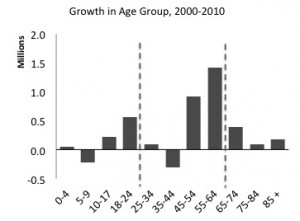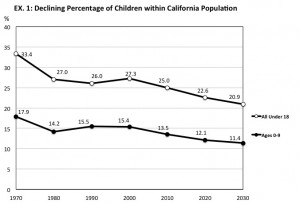Think of it like a mushroom. Up near the top, there’s a big, fat cap of Baby Boomers; down below, the stem is struggling to hold up under the weight.

USC’ Dowell Myers says The Day of Demographic Reckoning has come upon us. We share his thoughts because he's the lead researcher on a recently released report from the University of Southern California and the Lucile Packard Foundation, "California's Diminishing Resource: Children." Myers and his team analyzed data from the 2010 census and the American Community Survey to conclude that we're coming up on a rather large problem, economically speaking.
“It’s been sneaking up on us gradually, and it has finally arrived," Myers told The California Report. "The oldest Baby Boomer turned 65 last year, and now 18 years of Baby Boomers are going to cross that line."
In 1970, children made up more than one-third of California's population. By 2030, they're expected to account for just one-fifth. In 1970, California averaged 21 seniors for every 100 working-age adults. By 2030, that ratio is expected to rise to 36 seniors for every 100 working-age adults. Even if all of us with a mind to bear children were to get busy today in a mass effort to add to the population pool, we simply could not populate the state in time to offset the monster wave of retirees coming our way.
Instead, we’re actually having fewer children these days than we did 10 years ago. The state's birthrate fell to 1.94 children per woman in 2010. Replacement level would be 2.1 children.
